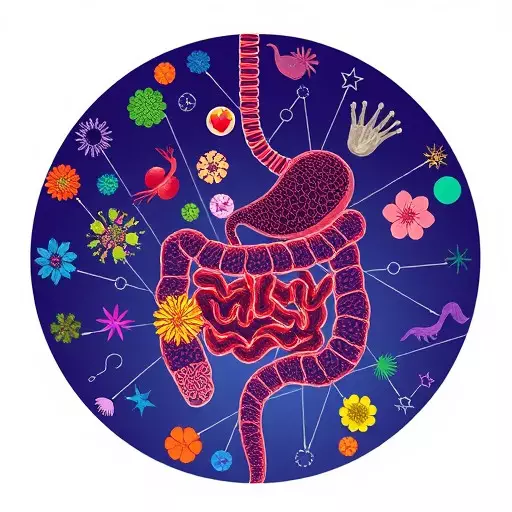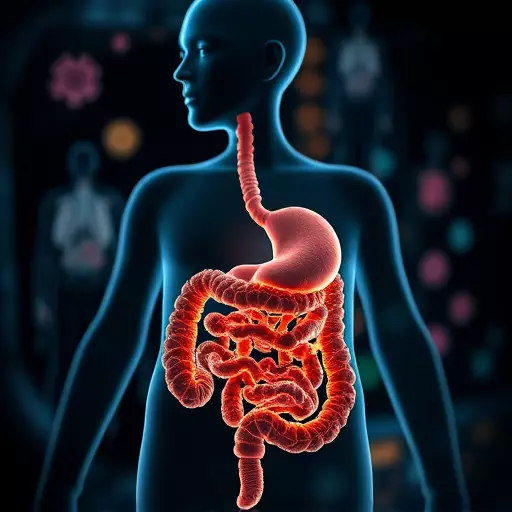Functional medicine in Toledo offers a holistic approach to restoring gut health by addressing the root cause of dysbiosis—an imbalance in gut bacteria. This disruption can lead to nutrient deficiencies and systemic inflammation. By promoting microbial diversity through dietary adjustments, such as increased fiber intake, probiotics, prebiotics, and eliminating inflammatory foods, practitioners aim to optimize nutrient absorption and overall well-being. A balanced diet, regular exercise, and adequate sleep are key lifestyle modifications that support gut health and reduce inflammation. Microbial diversity is crucial for digestion, immunity, and mental wellness, making it a vital indicator of systemic health in functional medicine practices in Toledo.
In today’s world, gut-related nutrient deficiencies are on the rise, often stemming from gut dysbiosis—an imbalance in our intestinal microbiota. This disruption can hinder nutrient absorption, leading to various health issues. Fortunately, functional medicine offers effective solutions to restore balance in the gut and unlock the secrets to systemic health through microbial diversity. This article explores comprehensive strategies, including dietary approaches, probiotic usage, lifestyle modifications, and more, leveraging the expertise of functional medicine practitioners in Toledo.
- Understanding Gut Dysbiosis and Its Impact on Nutrient Absorption
- The Role of Functional Medicine in Restoring Gut Balance
- Microbial Diversity: Unlocking the Secret to Systemic Health
- Dietary Approaches to Support Gut Health and Nutrient Availability
- Probiotics, Prebiotics, and Their Influence on Gut Microbiota
- Lifestyle Modifications for Optimal Gut Function and Nutrition Absorption
Understanding Gut Dysbiosis and Its Impact on Nutrient Absorption

Gut dysbiosis refers to an imbalance in the diverse ecosystem of bacteria and other microorganisms that live in our intestines. This delicate balance is crucial for maintaining optimal health, particularly when it comes to nutrient absorption. Modern lifestyles, dietary choices, and various environmental factors can disrupt this microbial diversity, leading to gut dysbiosis.
When gut dysbiosis occurs, certain beneficial bacteria may be reduced while harmful pathogens increase. This imbalance can hinder the proper breakdown and absorption of essential nutrients from food. As a result, even if you’re consuming a nutritious diet, your body might not be able to extract and utilize all the necessary vitamins, minerals, and other nutrients. Restoring balance in gut dysbiosis is therefore key to achieving systemic health, and functional medicine in Toledo offers promising approaches to do just that by focusing on dietary interventions, probiotics, prebiotics, and other natural strategies to enhance microbial diversity.
The Role of Functional Medicine in Restoring Gut Balance

Functional Medicine in Toledo offers a holistic approach to restoring gut balance and addressing nutrient deficiencies. By focusing on the intricate relationship between the gut microbiota and overall health, functional medicine practitioners aim to correct dysbiosis—an imbalance in gut bacteria. This involves identifying and addressing root causes such as diet, stress, and environmental factors that contribute to gut dysfunction.
Restoring balance in the gut is key to systemic health, as microbial diversity plays a vital role in digestion, immune function, and even mental well-being. Through personalized treatment plans, functional medicine practitioners use tools like dietary interventions, probiotics, prebiotics, and other natural therapies to nurture beneficial bacteria and eliminate harmful pathogens. This tailored approach ensures that the gut can efficiently absorb nutrients, thereby improving overall health and vitality.
Microbial Diversity: Unlocking the Secret to Systemic Health

The gut is often referred to as our second brain due to its profound impact on overall health and well-being, especially when it comes to nutrient absorption and metabolism. Functional medicine in Toledo emphasizes addressing root causes of illness, and one of the key areas of focus is restoring balance in gut dysbiosis. Microbial diversity plays a pivotal role here; our gut is home to trillions of microorganisms that contribute to digestion, immune function, and even mental health. When this delicate ecosystem becomes imbalanced, leading to conditions like dysbiosis, it can result in nutrient deficiencies and systemic inflammation.
By implementing functional medicine approaches, practitioners aim to cultivate and restore microbial diversity. This involves dietary interventions such as increasing fiber intake and introducing beneficial probiotics and prebiotics. Additionally, eliminating inflammatory foods and managing stress are essential components of this process. Through these strategies, the gut can regain its optimal functionality, allowing for improved nutrient absorption and a stronger immune response, ultimately contributing to systemic health.
Dietary Approaches to Support Gut Health and Nutrient Availability

Maintaining a balanced diet is a cornerstone of functional medicine in Toledo, offering a natural approach to resolving gut-related nutrient deficiencies. Restoring balance in gut dysbiosis involves nurturing microbial diversity, which plays a pivotal role in systemic health. By incorporating diverse, whole foods rich in fiber and prebiotics, individuals can support the growth of beneficial bacteria and enhance nutrient absorption.
Functional medicine practitioners emphasize the importance of listening to one’s body and tailoring dietary choices accordingly. This may include eliminating processed foods and additives that disrupt gut flora, as well as identifying and addressing any food sensitivities or allergies. Promoting microbial diversity through a diverse diet ensures optimal nutrient availability, contributing to overall wellness and vitality.
Probiotics, Prebiotics, and Their Influence on Gut Microbiota

Probiotics and prebiotics play pivotal roles in restoring balance in gut dysbiosis with functional medicine. These functional solutions aim to nurture a healthy gut microbiota, which is essential for overall systemic health. Probiotics, often referred to as “good bacteria,” introduce beneficial micro-organisms into the digestive tract, enhancing digestion and nutrient absorption. They help prevent the overgrowth of harmful bacteria, reducing inflammation and supporting immune function.
Prebiotics, on the other hand, serve as food for these good bacteria. Found in foods like fiber-rich vegetables, fruits, and whole grains, prebiotics promote microbial diversity within the gut. A diverse gut microbiota is a key indicator of systemic health. By promoting the growth of beneficial bacteria, prebiotics help maintain a balanced ecosystem in the gut, which has been shown to have far-reaching effects on overall well-being, including improved digestion, enhanced nutrient extraction from food, and better immune response. In the context of functional medicine in Toledo, these natural approaches can be powerful tools for addressing gut-related nutrient deficiencies.
Lifestyle Modifications for Optimal Gut Function and Nutrition Absorption

In many cases, addressing gut-related nutrient deficiencies lies not just in what we eat but also in how we live. Lifestyle modifications are a cornerstone of functional medicine in Toledo and beyond. Restoring balance in gut dysbiosis starts with adopting habits that nurture microbial diversity—the key to systemic health. A balanced diet rich in prebiotics and probiotics, alongside regular exercise and adequate sleep, can significantly enhance digestion and nutrient absorption.
These lifestyle changes not only support the gut microbiota but also reduce inflammation and improve overall gut health. By focusing on these holistic approaches, individuals can create an environment conducive to optimal nutrient absorption, ensuring that their bodies receive the full benefit of the food they consume. This personalized approach to wellness leverages the power of functional medicine to treat the root cause of nutrient deficiencies rather than merely managing symptoms.
